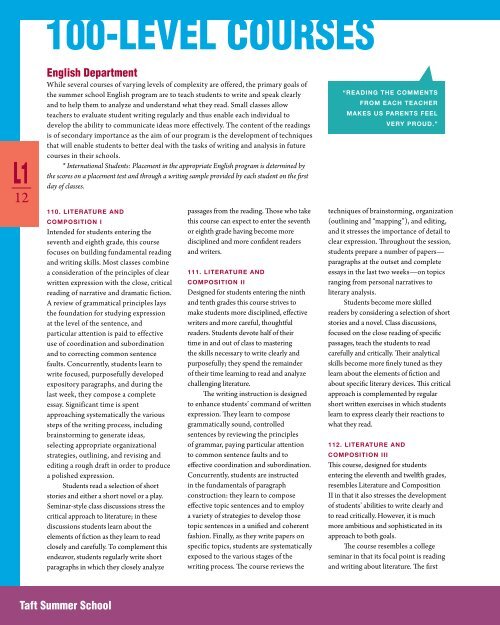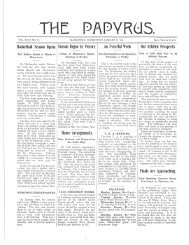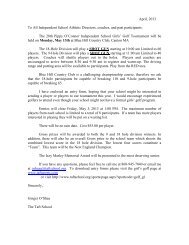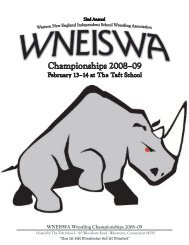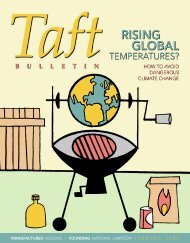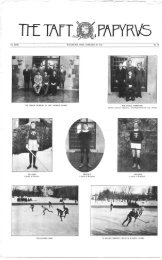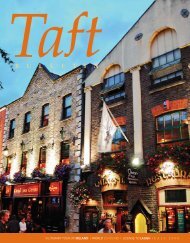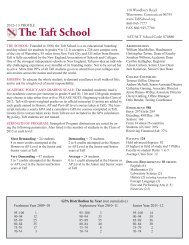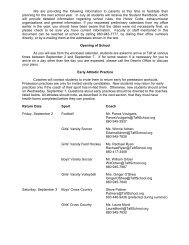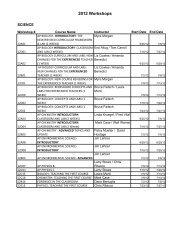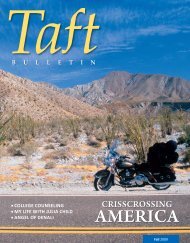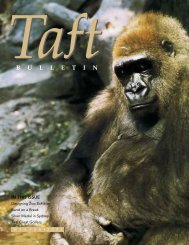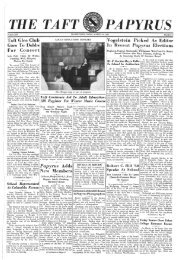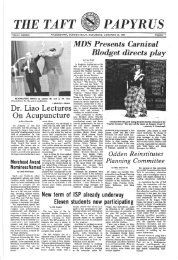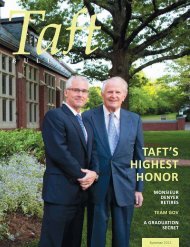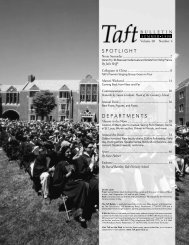Summer School - The Taft School
Summer School - The Taft School
Summer School - The Taft School
Create successful ePaper yourself
Turn your PDF publications into a flip-book with our unique Google optimized e-Paper software.
100-Level courses<br />
L1<br />
12<br />
English Department<br />
While several courses of varying levels of complexity are offered, the primary goals of<br />
the summer school English program are to teach students to write and speak clearly<br />
and to help them to analyze and understand what they read. Small classes allow<br />
teachers to evaluate student writing regularly and thus enable each individual to<br />
develop the ability to communicate ideas more effectively. <strong>The</strong> content of the readings<br />
is of secondary importance as the aim of our program is the development of techniques<br />
that will enable students to better deal with the tasks of writing and analysis in future<br />
courses in their schools.<br />
* International Students: Placement in the appropriate English program is determined by<br />
the scores on a placement test and through a writing sample provided by each student on the first<br />
day of classes.<br />
110. Literature and<br />
Composition I<br />
Intended for students entering the<br />
seventh and eighth grade, this course<br />
focuses on building fundamental reading<br />
and writing skills. Most classes combine<br />
a consideration of the principles of clear<br />
written expression with the close, critical<br />
reading of narrative and dramatic fiction.<br />
A review of grammatical principles lays<br />
the foundation for studying expression<br />
at the level of the sentence, and<br />
particular attention is paid to effective<br />
use of coordination and subordination<br />
and to correcting common sentence<br />
faults. Concurrently, students learn to<br />
write focused, purposefully developed<br />
expository paragraphs, and during the<br />
last week, they compose a complete<br />
essay. Significant time is spent<br />
approaching systematically the various<br />
steps of the writing process, including<br />
brainstorming to generate ideas,<br />
selecting appropriate organizational<br />
strategies, outlining, and revising and<br />
editing a rough draft in order to produce<br />
a polished expression.<br />
Students read a selection of short<br />
stories and either a short novel or a play.<br />
Seminar-style class discussions stress the<br />
critical approach to literature; in these<br />
discussions students learn about the<br />
elements of fiction as they learn to read<br />
closely and carefully. To complement this<br />
endeavor, students regularly write short<br />
paragraphs in which they closely analyze<br />
passages from the reading. Those who take<br />
this course can expect to enter the seventh<br />
or eighth grade having become more<br />
disciplined and more confident readers<br />
and writers.<br />
111. Literature and<br />
Composition II<br />
Designed for students entering the ninth<br />
and tenth grades this course strives to<br />
make students more disciplined, effective<br />
writers and more careful, thoughtful<br />
readers. Students devote half of their<br />
time in and out of class to mastering<br />
the skills necessary to write clearly and<br />
purposefully; they spend the remainder<br />
of their time learning to read and analyze<br />
challenging literature.<br />
<strong>The</strong> writing instruction is designed<br />
to enhance students’ command of written<br />
expression. <strong>The</strong>y learn to compose<br />
grammatically sound, controlled<br />
sentences by reviewing the principles<br />
of grammar, paying particular attention<br />
to common sentence faults and to<br />
effective coordination and subordination.<br />
Concurrently, students are instructed<br />
in the fundamentals of paragraph<br />
construction: they learn to compose<br />
effective topic sentences and to employ<br />
a variety of strategies to develop those<br />
topic sentences in a unified and coherent<br />
fashion. Finally, as they write papers on<br />
specific topics, students are systematically<br />
exposed to the various stages of the<br />
writing process. <strong>The</strong> course reviews the<br />
“reading the comments<br />
from each teacher<br />
makes us parents feel<br />
very proud.”<br />
techniques of brainstorming, organization<br />
(outlining and “mapping”), and editing,<br />
and it stresses the importance of detail to<br />
clear expression. Throughout the session,<br />
students prepare a number of papers—<br />
paragraphs at the outset and complete<br />
essays in the last two weeks—on topics<br />
ranging from personal narratives to<br />
literary analysis.<br />
Students become more skilled<br />
readers by considering a selection of short<br />
stories and a novel. Class discussions,<br />
focused on the close reading of specific<br />
passages, teach the students to read<br />
carefully and critically. <strong>The</strong>ir analytical<br />
skills become more finely tuned as they<br />
learn about the elements of fiction and<br />
about specific literary devices. This critical<br />
approach is complemented by regular<br />
short written exercises in which students<br />
learn to express clearly their reactions to<br />
what they read.<br />
112. Literature and<br />
Composition III<br />
This course, designed for students<br />
entering the eleventh and twelfth grades,<br />
resembles Literature and Composition<br />
II in that it also stresses the development<br />
of students’ abilities to write clearly and<br />
to read critically. However, it is much<br />
more ambitious and sophisticated in its<br />
approach to both goals.<br />
<strong>The</strong> course resembles a college<br />
seminar in that its focal point is reading<br />
and writing about literature. <strong>The</strong> first<br />
<strong>Taft</strong> <strong>Summer</strong> <strong>School</strong>


